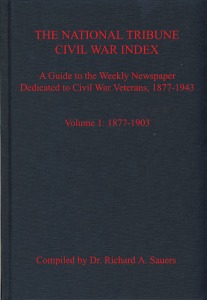A good review of an important new resource for Civil War researchers.
 Folks have been waiting a long time for something like this, though I wasn’t sure if we’d see it in expensive print format or free and easy-to-use website. The former has won out with Savas Beatie’s publication of Richard Sauers’s The National Tribune Civil War Index: A Guide to the Weekly Newspaper Dedicated to Civil War Veterans, 1877-1943. The set is three volumes, the first two a chronological listing of articles and the third, really the meat and potatoes as far as I’m concerned, a Subject, Author, and Unit Index. The subtitle gives the preview away, though I’d point out that the National Tribune was an outlet for Union Civil War veterans – the counterpart, if you will, of the Confederate Veteran, and the precursor to the long-running military publication Stars and Stripes.
Folks have been waiting a long time for something like this, though I wasn’t sure if we’d see it in expensive print format or free and easy-to-use website. The former has won out with Savas Beatie’s publication of Richard Sauers’s The National Tribune Civil War Index: A Guide to the Weekly Newspaper Dedicated to Civil War Veterans, 1877-1943. The set is three volumes, the first two a chronological listing of articles and the third, really the meat and potatoes as far as I’m concerned, a Subject, Author, and Unit Index. The subtitle gives the preview away, though I’d point out that the National Tribune was an outlet for Union Civil War veterans – the counterpart, if you will, of the Confederate Veteran, and the precursor to the long-running military publication Stars and Stripes.
This is a wonderful companion to digitized collections of National Tribune, such as this one…
View original post 264 more words

